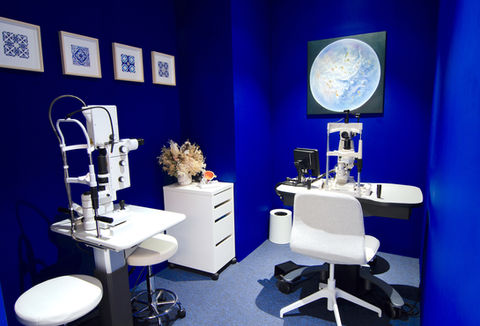

PRK
Eye Surgery
Photorefractive Keratectomy
A surface-based laser procedure that gently reshapes the cornea to improve vision with lasting results. PRK is flap-free, safe, and clinically proven for long-term visual clarity.
Refractive Eye Surgery now available at
The Straits Eye Centre, Camden Medical Centre.
Photorefractive Keratectomy
PRK gently removes the outermost layer of the cornea, then uses an excimer laser to reshape its surface and correct vision. It is commonly performed as a flap-free, surface-based procedure for those suited to this approach.
Is PRK the Right Fit for Your Vision?
Common Profiles for Photorefractive Keratectomy

Not Eligible for LASIK?
PRK is often recommended for patients with thinner corneas, previous eye surgeries, or surface irregularities that make flap-based procedures less suitable.

Active or Hands-On Work?
As a flap-free procedure, PRK reduces the risk of complications from physical activity, sports, or occupations with frequent eye exposure.

Prefer a Time-Tested Technique?
PRK has been performed since the 1980s, with decades of proven results and stable, long-term visual outcomes.
What Happens During a PRK Procedure?
A Surface-Based Laser Technique with Proven Outcomes
PRK begins by gently removing the outermost layer of the cornea (epithelium), which naturally regenerates over time. An excimer laser is then used to precisely reshape the corneal surface, improving how light enters the eye and enhancing visual clarity.
As there is no corneal flap created, PRK is often preferred for patients with thinner corneas or those with active, contact-prone lifestyles. A soft contact lens is placed over the eye to support healing in the initial recovery period.
How PRK Compares to Other Laser Procedures
Your surgeon will recommend the best option for your eyes after a full diagnostic assessment

What You’ll
Experience at The Straits Eye Centre
Your PRK journey starts with a full diagnostic assessment, followed by a personalised medical evaluation by your ophthalmologist
STEP
01
Diagnostic Assessment
Your journey starts with an in-depth eye screening using advanced diagnostic technology. We evaluate your vision, corneal health, and overall eye condition, no shortcuts, no guesswork.
STEP
02
Ophthalmologist Consultation
Your ophthalmologist will review your scan results with you, understand your visual needs and lifestyle, and determine whether PRK is the most appropriate treatment option.
STEP
03
Surgery
(If Suitable)
If PRK is recommended, your procedure will be scheduled. The treatment is quick, typically completed in under 30 minutes. Your ophthalmologist will guide you through the expected recovery process and follow-up care.
STEP
04
Recovery
& Ongoing Care
After surgery, you’ll receive clear recovery instructions, follow-up appointments, and personalised support to ensure your healing progresses smoothly and your vision remains on track.
YOUR
SENIOR EYE
SPECIALIST
DR JAYANT V IYER
MBBS, GDFM, MMed(Ophth), FAMS, FRCOphth
Spoken Languages:
English, Tamil, Basic Mandarin

Former Senior Consultant & Global Ophthalmology Lead at SNEC
Dr Jayant, formerly Senior Consultant at the Singapore National Eye Centre (SNEC) had also set up its Global Ophthalmology division and was Head of its Clinical & Service Quality department. He has won numerous awards for his commitment to patient-centred care and contribution to eyecare locally and globally.
Award-Winning Ophthalmologist
Dr. Lee has been recognised with multiple awards, including the Singapore Courage Fund Healthcare Humanity Award and the Young Eye Care Ambassador Award, underscoring his commitment to compassionate and innovative eye care.
YOUR
SENIOR EYE
SPECIALIST
DR JASON LEE
MBBS, BMedSc, MMed(Ophth), FAMS, FRCOphth
Spoken Languages:
English, Mandarin, Hokkien


Ready for Clearer Vision?
PRK is one of several advanced refractive options available at The Straits Eye Centre, Camden Medical Centre. Our goal is to help you make an informed decision with no pressure and full clinical transparency.
All medical procedures come with risks and benefits. Always consult your ophthalmologist for a full evaluation.












